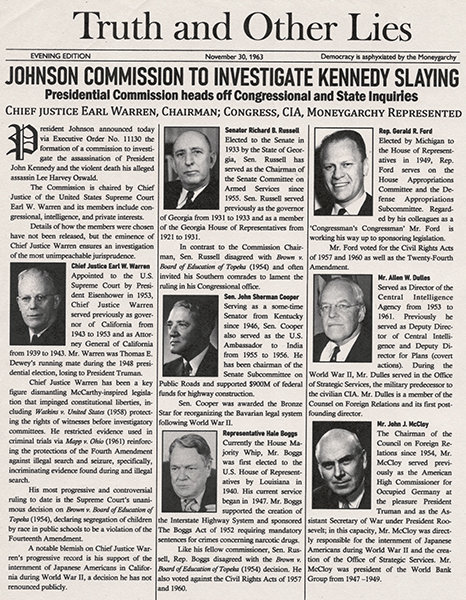President Johnson announced today via Executive Order No. 11130 the formation of a commission to investigate the assassination of President John Kennedy and the violent death his alleged assassin Lee Harvey Oswald.
The Commission is chaired by Chief Justice of the United States Supreme Court Earl W. Warren and its members include congressional, intelligence, and private interests.
Details of how the members were chosen have not been released, but the eminence of Chief Justice Warren ensures an investigation of the most unimpeachable jurisprudence.
Chief Justice Earl W. Warren
Appointed to the U.S. Supreme Court by President Eisenhower in 1953, Chief Justice Warren served previously as governor of California from 1943 to 1953 and as Attorney General of California from 1939 to 1943. Mr. Warren was Thomas E. Dewey’s running mate during the 1948 presidential election, losing to President Truman.
Chief Justice Warren has been a key figure dismantling McCarthy-inspired legislation that impinged constitutional liberties, including Watkins v. United States (1958) protecting the rights of witnesses before investigatory committees. He restricted evidence used in criminal trials via Mapp v. Ohio (1961) reinforcing the protections of the Fourth Amendment against illegal search and seizure, specifically, incriminating evidence found during and illegal search.
His most progressive and controversial ruling to date is the Supreme Court’s unanimous decision on Brown v. Board of Education of Topeka (1954), declaring segregation of children by race in public schools to be a violation of the Fourteenth Amendment.
A notable blemish on Chief Justice Warren’s progressive record is his support of the internment of Japanese Americans in California during World War II, a decision he has not renounced publicly.
Senator Richard B. Russell
Elected to the Senate in 1933 by the State of Georgia, Sen. Russell has served as the Chairman of the Senate Committee on Armed Services since 1955. Sen. Russell served previously as the governor of Georgia from 1931 to 1933 and as a member of the Georgia House of Representatives from 1921 to 1931.
In contrast to the Commission Chairman, Sen. Russell disagreed with Brown v. Board of Education of Topeka (1954) and often invited his Southern comrades to lament the ruling in his Congressional office.
Sen. John Sherman Cooper
Serving as a some-time Senator from Kentucky since 1946, Sen. Cooper also served as the U.S. Ambassador to India from 1955 to 1956. He has been chairman of the Senate Subcommittee on Public Roads and supported $900M of federal funds for highway construction.
Sen. Cooper was awarded the Bronze Star for reorganizing the Bavarian legal system following World War II.
Representative Hale Boggs
Currently the House Majority Whip, Mr. Boggs was first elected to the U.S. House of Representatives by Louisiana in 1940. His current service began in 1947. Mr. Boggs supported the creation of the Interstate Highway System and sponsored The Boggs Act of 1952 requiring mandatory sentences for crimes concerning narcotic drugs.
Like his fellow commissioner, Sen. Russell, Rep. Boggs disagreed with the Brown v. Board of Education of Topeka (1954) decision. He also voted against the Civil Rights Acts of 1957 and 1960.
Rep. Gerald R. Ford
Elected by Michigan to the House of Representatives in 1949, Rep. Ford serves on the House Appropriations Committee and the Defense Appropriations Subcommittee. Regarded by his colleagues as a ‘Congressman’s Congressman’ Mr. Ford is working his way up to sponsoring legislation.
Mr. Ford voted for the Civil Rights Acts of 1957 and 1960 as well as the Twenty-Fourth Amendment.
Mr. Allen W. Dulles
Served as Director of the Central Intelligence Agency from 1953 to 1961. Previously he served as Deputy Director of Central Intelligence and Deputy Director for Plans (covert actions). During the World War II, Mr. Dulles served in the Office of Strategic Services, the military predecessor to the civilian CIA. Mr. Dulles is a member of the Counsel on Foreign Relations and its first post-founding director.
Mr. John J. McCloy
The Chairman of the Council on Foreign Relations since 1954, Mr. McCloy served previously as the American High Commissioner for Occupied Germany at the pleasure President Truman and as the Assistant Secretary of War under President Roosevelt; in this capacity, Mr. McCloy was directly responsible for the internment of Japanese Americans during World War II and the creation of the Office of Strategic Services. Mr. McCloy was president of the World Bank Group from 1947 –1949.



